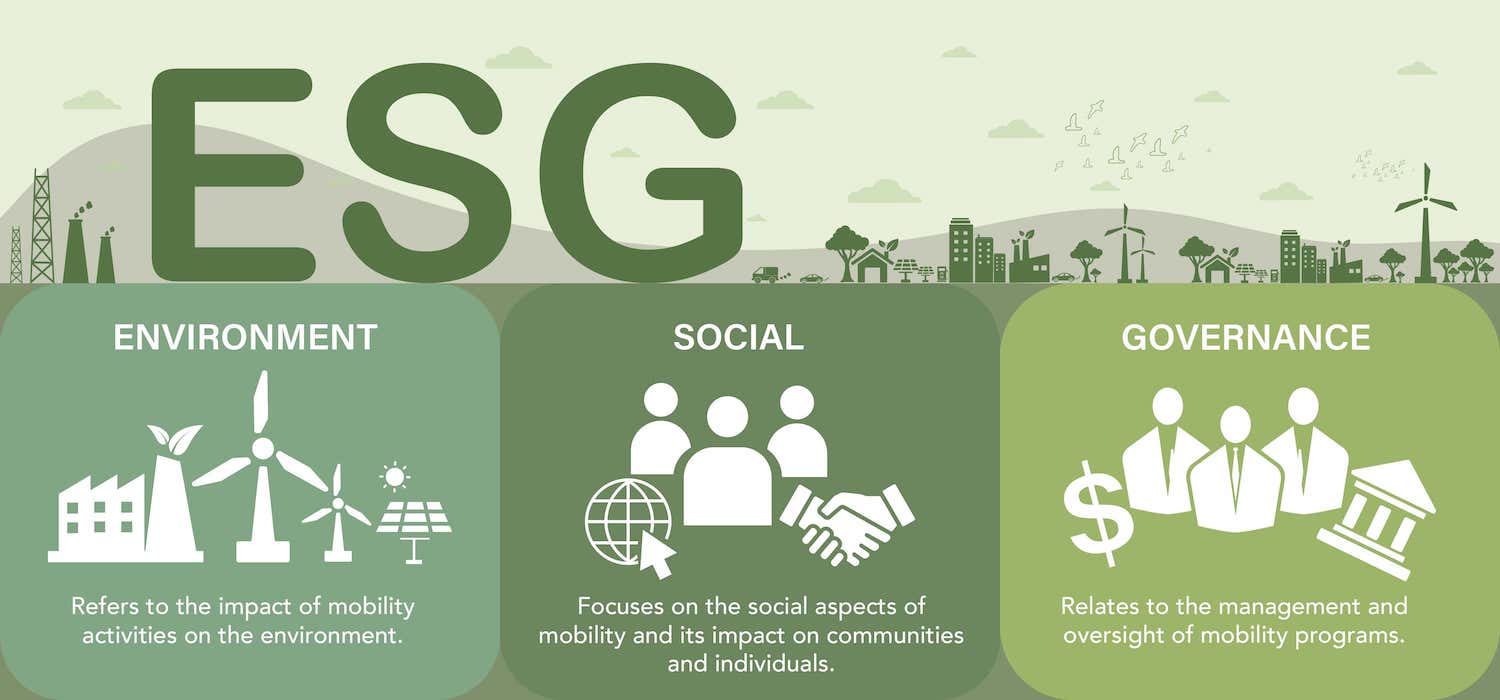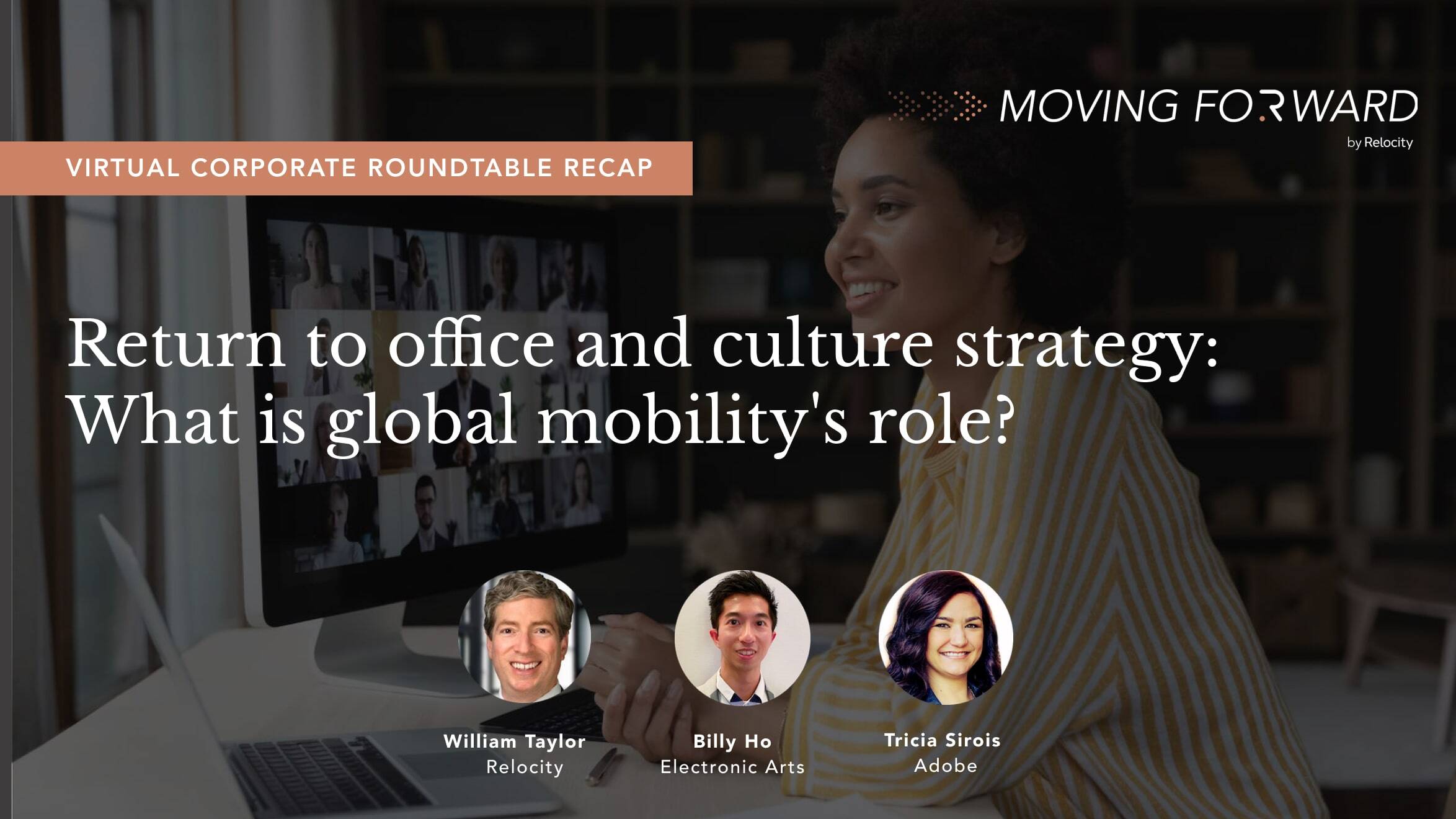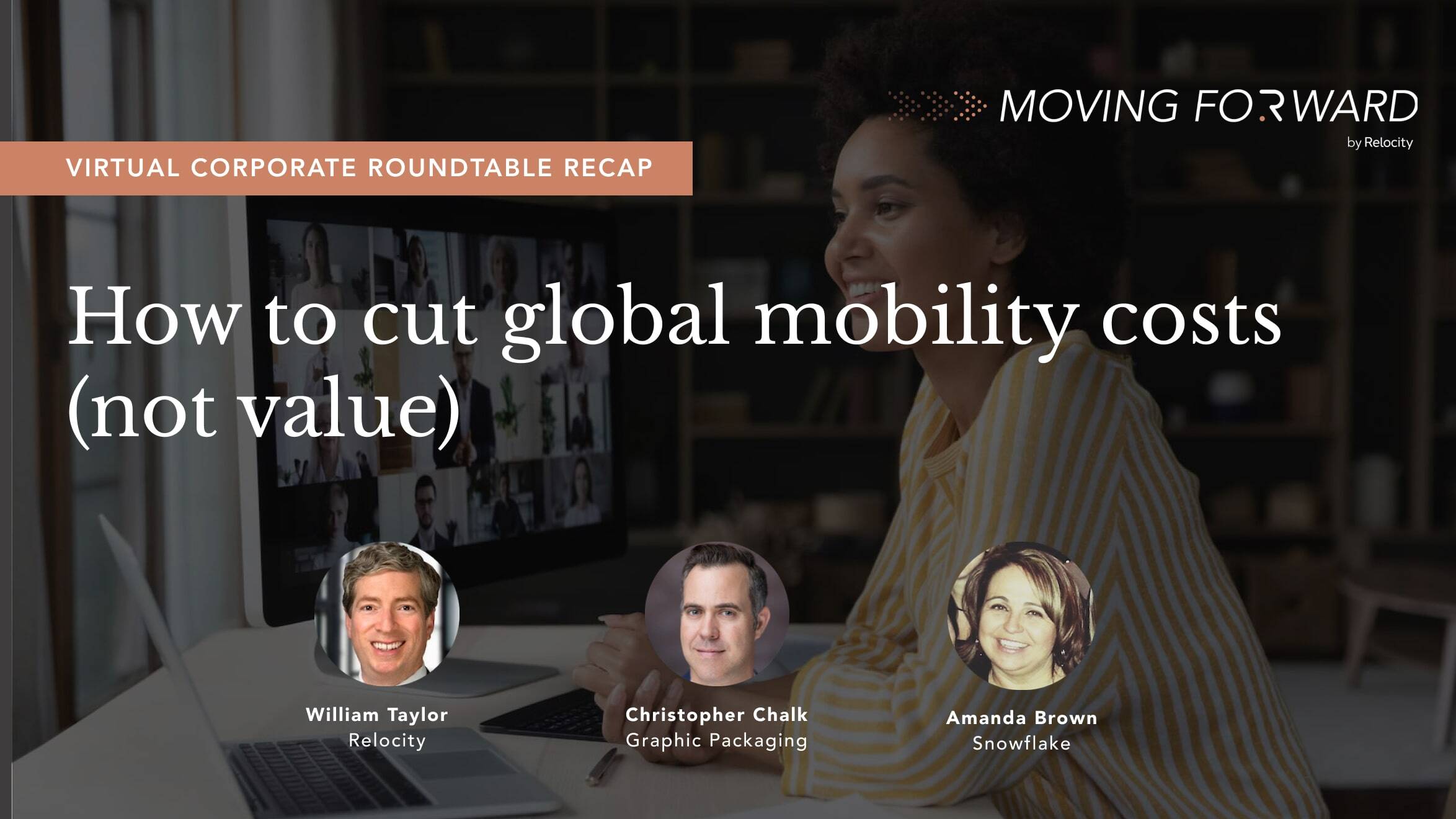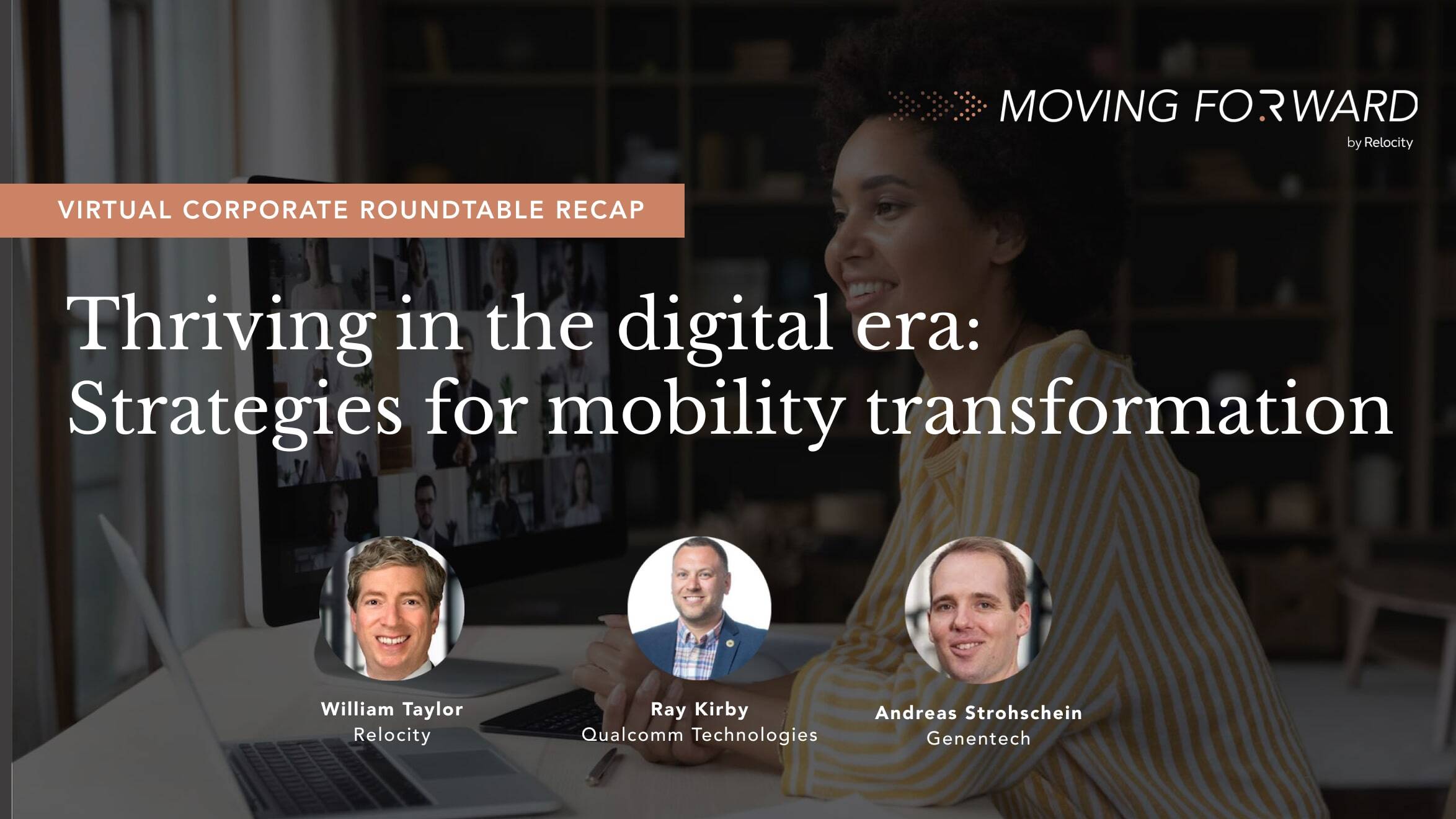5 takeaways from Relocity’s first virtual corporate roundtable | Relocity
Relocity recently hosted our first virtual event as part of our corporate roundtable series: Moving Forward. Through these corporate roundtables,...
![[Recap] Relocity’s roundtable on ESG | Relocity](https://www.relocity.com/hubfs/Imported_Blog_Media/64a7350ce778a81576d7ba21_RTO%20Recap%20Blog%20Main%20-%20ESG-min-1.jpg)
Relocity recently hosted our third virtual event as part of our corporate roundtable series: Moving Forward. These corporate roundtables bring corporate mobility professionals together to engage in open conversations and benchmarking around key topics.
On June 29, Becky Woods, Senior Director of Global Mobility at ADP, and Jennifer Fontaine, Senior Analyst of Global Mobility at the Gates Foundation, joined Relocity’s Head of Partnerships and Moving Forward host William Taylor to discuss how to integrate environmental, social, and governance (ESG) into global mobility practices.
We began our roundtable by learning more about Woods and Fontaine’s roles and the mobility programs at human capital management (HCM) solutions provider ADP and private nonprofit Gates Foundation. ADP manages in-house global mobility and US immigration, using a relocation management company (RMC) for home sale and purchase. Gates Foundation outsources most relocation and immigration services to RMC partners and suppliers.

ESG is a framework that evaluates the ecological sustainability, human impact, and ethical practices of organizations. The global mobility industry has a significant opportunity to reduce carbon emissions for a greener future by adopting environmentally friendly practices and investing in new technologies. From the social perspective, mobility teams can look to provide equitable access to transportation services and positive work environments while implementing diversity, equity, and inclusion (DEI) initiatives affecting communities, individuals, and the employee experience. Lastly, mobility programs impact their organizations’ overall governance score via:
• Policies.
• Compliance.
• Duty of Care.
• The composition and responsibilities of the board, for publicly traded companies.
• And more.
By embracing ESG principles, mobility teams can make strides towards environmental sustainability, social equity, and ethical governance.

Fontaine highlighted the potential for sustainable change in mobility. While the Gates Foundation relies on business travel and mobility, sustainability is a focus. She aligns her team's actions with the organization's philosophy, considering ESG views of leadership and realigning policies accordingly.
She also highlighted that collaboration and incremental change are of paramount importance as the global mobility industry addresses sustainability challenges. Recognizing that sustainability cannot be achieved overnight, Fontaine advocates for the "1% approach," which targets incremental adjustments and improvements. By taking small steps and continuously striving for progress, the industry can drive meaningful change over time.
The Gates Foundation emphasizes collaboration with suppliers to improve ESG. While sustainability strategies vary by region, engaging with suppliers allows for active collaboration and incremental policy adjustments aligned with corporate sustainability goals.

Woods suggests using technology to reduce and measure environmental impacts in global mobility. Virtual area tours minimize physical travel, while integrating technology into administrative processes improves efficiency and sustainability. Dashboards like Tableau help track and report sustainability metrics. Woods advises requesting sustainability performance dashboards from suppliers, vendors, and partners.
Woods also recommends understanding stakeholders' needs and preferences for sustainability data to determine relevant metrics. Global mobility teams should create dedicated sustainability dashboards to track progress towards ESG goals and report this data to business, HR and executive teams to build support for corporate sustainability initiatives.

While companies are at different stages of the sustainability journey, Woods and Fontaine agreed that sustainability is growing in importance in the supplier-selection process. However, the significance of sustainability varies depending on the type of service provided. For instance, sustainability has a strong impact in household goods shipping (where the environmental impact is high), but may have less relevance in a service like cross-cultural training, where virtual delivery is already leveraged (resulting in a small environmental impact).
They suggest including questions about supplier sustainability initiatives and cultural integration of sustainability in RFPs to assess their alignment with your company’s sustainability and ESG goals. The ideal partner should support existing sustainability practices and drive further progress. By considering these factors and asking targeted questions, global mobility teams can make informed decisions and collaborate with suppliers who prioritize sustainability and ESG.

Woods and Fontaine both recognized that cost can prevent decision-makers from implementing sustainable initiatives. Woods suggested that global mobility leaders communicate the long-term value and impact of such initiatives to quell hesitation around upfront costs. Leadership should view sustainability initiatives as long-term investments. By doing so, global mobility leaders can encourage decision-makers to consider sustainability and ESG as a strategic priority, even if costs rise in the short term.
When asked about incorporating a social focus into their global mobility programs, Woods and Fontaine shared various strategies to address ESG issues such as DEI. Woods focuses on pay equity, transparency laws, ethics policies, and benefits at ADP, while Fontaine conducts policy reviews for social fairness at the Gates Foundation. Conducting regular policy reviews and considering employee feedback helps global mobility teams address social challenges and promote flexibility.

The roundtable’s open discussion brought forth several key insights related to sustainability, collaboration, and DEI. Collaboration and information-sharing were highlighted as crucial for driving sustainability initiatives. Organizations at an early stage of their sustainability journey were encouraged to incorporate sustainability goals into mobility policies.
Moving Forward host William Taylor and attendees from Twilio, Salesforce, Cisco, and Relocity shared examples of social responsibility, sustainability, and DEI efforts in their organizations. Twilio sets sustainability goals and includes DEI reporting from suppliers. Salesforce integrates sustainability as a core corporate value and engages suppliers in sustainability discussions. Cisco focuses on DEI and sustainability through its HR and talent acquisition departments. Relocity received recognition for its virtual services that reduce carbon emissions, winning the Expatriate Management & Mobility Award (EMMA) for the Best Global Mobility Sustainability Initiative of the Year award. These examples highlight the commitment of these organizations to promote sustainability and diversity within their mobility programs.
The roundtable discussion addressed challenges related to immigration barriers for same-sex couples and emphasized the importance of safety and Duty of Care. Government lobbying for H-1B workers and the impact on career opportunities were also discussed. Strong partnerships with HR business partners were highlighted as crucial in addressing employee challenges.
The participants also acknowledged that sustainability is increasingly important to candidates and employees, especially younger generations. Candidates consider relocation benefits and company culture related to ESG, and green benefits and corporate sustainability objectives influence their choice of employer. The discussion provided valuable insights into the sustainability challenges and opportunities faced by global mobility leaders.

We hope that these latest mobility insights about sustainability and ESG are helpful. Stay tuned for information about our next virtual corporate roundtable about best-in-class intern programs on August 17, 2023, when we’ll bring corporate mobility professionals together again to talk about trends, benchmark, and learn from each other.
Want to learn more about sustainable partnerships? Discover how to collaborate with sustainability-focused suppliers and vendors.

Relocity recently hosted our first virtual event as part of our corporate roundtable series: Moving Forward. Through these corporate roundtables,...

Relocity recently hosted our second virtual event as part of our corporate roundtable series: Moving Forward. These corporate roundtables bring...

At Relocity’s latest corporate roundtable in the Moving Forward series on June 11, key industry leaders discussed technology's impact on relocation. ...